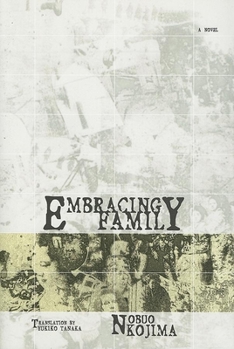Book Overview
Set during the U.S. Occupation following World War II, Embracing Family is a novel of conflict--between Western and Eastern traditions, between a husband and wife, between ideals and reality. At the... This description may be from another edition of this product.
Format:Hardcover
Language:English
ISBN:1564784053
ISBN13:9781564784056
Release Date:December 2005
Publisher:Dalkey Archive Press
Length:161 Pages
Weight:0.85 lbs.
Dimensions:0.9" x 6.1" x 9.1"
Grade Range:Postsecondary and higher
Related Subjects
Fiction Genre Fiction Historical Literary Literature & Fiction Romance War World LiteratureCustomer Reviews
1 rating
"I'm in pain, and you're acting like YOU need help."
Published by Thriftbooks.com User , 18 years ago
Written in 1965 by Nobuo Kojima, the author of more than thirty books, Embracing Family is the first of Kojima's novels to be translated into English. Set in Japan during the American Occupation after World War II, it is the story of a troubled marriage, the two parties no longer communicating on any level. Shunsuke, a formal man who never says or does anything that pleases his wife, travels a great deal, giving lectures on "the American way of life" to audiences of housewives. His own wife, a vain, self-indulgent woman who is more interested in her appearance, plastic surgery, and an expensive home than in her children or her husband, mocks him in public. It gives away nothing to reveal that Shunsuke has had numerous relationships while on the road, a common and accepted behavior for businessmen, but when Shunsuke discovers that Tokiko has had an affair with a young American serviceman, he is appalled that she has insulted him by violating traditional values and her role as a woman. Determined to save the marriage to protect his son and daughter, Shunsuke embarks on a clumsy but sincere effort to initiate communication and reclaim his family life. He has little idea of who he really is or how to be a husband, while Tokiko has no idea at all of who she is. When a new crisis forces Shunsuke and Tokiko to depend upon each other for an extended period of time, their behavior and thinking are laid bare for the reader, who must then judge how much, if anything, either learns about each other and their marriage. Written for a Japanese audience, the novel makes cultural assumptions that may surprise American readers unfamiliar with the Japanese culture of forty years ago, when the novel was published. In addition, American influences, and the emphasis on personal freedom, are seen as detrimental to this marriage and threatening to all aspects of traditional culture. Tokiko, however, is rude and confrontational and, in refusing to take any responsibility at all, fails to be a positive example of traditional roles and culture, at the same time that she has no understanding of American independence. She is simply selfish. Ultimately, the fate of the family depends on the development of the characters' personal values and on their inner growth. The author exhibits a remarkable frankness about some issues but is restrained, by western standards, in revealing deep feelings, making the novel challenging for western readers. The ending, which feels abrupt, is appropriate thematically though a bit weak dramatically. Symbolism is obvious in context and requires no explanation--a dream that the children are being executed, the contamination of some pickled plums, a ghost. A rare glimpse of Japanese culture at a specific point in history, this novel explores the same subject matter as Junichiro Tanizaki's 1929 novel, Some Prefer Nettles, which, while more subtle and elegant, is less naturalistic. n Mary Whipple





